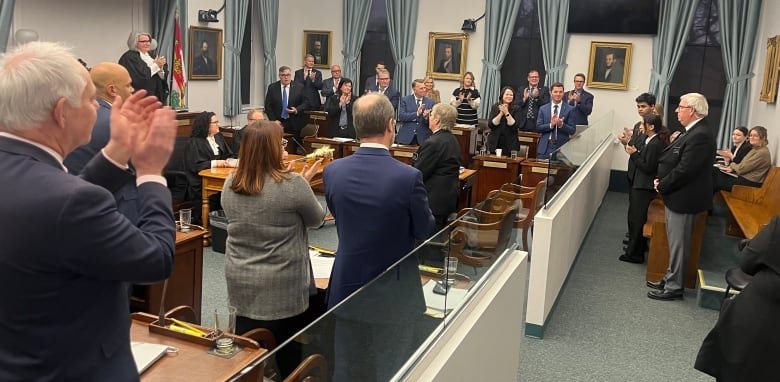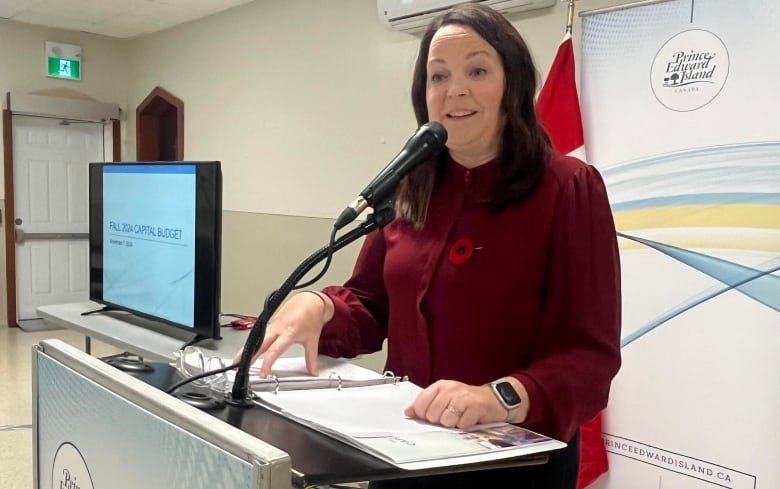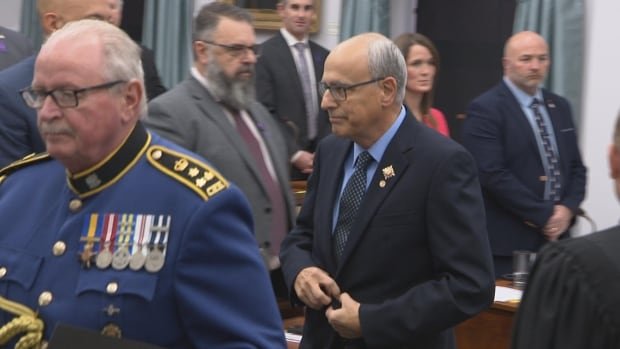The fall sitting of the P.E.I. legislature came to a close Friday, after four weeks and 16 sitting days.
Over that time, Dennis King’s Progressive Conservative government passed the largest capital budget in the province’s history — by a significant margin — and a legislative committee issued a rare parliamentary subpoena to compel the tourism minister to provide details on a sponsorship deal with the National Hockey League.

Here are some of the details and the drama from the sitting.
Hockey, hockey and more hockey
The province’s NHL deal was mentioned every single day of the sitting.
When the standing committee on education and economic growth issued a subpoena to Tourism Minister Zack Bell asking for a full copy of the contract (after he’d tabled a copy with all the dollar figures removed), it was only the third such subpoena issued since 2001.

That full contract showed the NHL deal will cost the province between $7.5 and $8.4 million over three years. The King government still has not said whether the contract will be extended beyond Dec. 31.
Last week, Liberal and Green members of the committee wrote to its chair, PC Brad Trivers, calling for another meeting to get information MLAs have been seeking on travel and other costs related to the contract. That didn’t happen, and during question period Friday, Bell cited Rule 101 of the legislature, saying it prohibits committees from meeting while the house is sitting.
The clerk confirmed to the media that the rule prohibits meetings during the actual hours the house is sitting. Committees meet all time during sittings, but outside sitting hours.
It’s worth noting that in 2019, the legislature changed the composition of most of its standing committees, giving each party in the house two seats. That fulfilled a campaign promise King made heading into that year’s election.
If the governing PCs still held the majority on committees, it seems highly unlikely this month’s subpoena would have been approved, let alone any future ones.
Just how big was the capital budget?
The government’s capital budget, which passed in a vote Friday, includes $483 million in spending on schools, highways, housing and health-care facilities for the coming fiscal year.
That represents a 31 per cent hike over the capital budget passed a year ago — and works out to $2,703 in spending for every single P.E.I. resident.

It’s also more than the combined value of three consecutive past capital budgets: the last two under the government of Wade MacLauchlan, tabled in 2017 and 2018, and the first capital budget King’s government tabled in the fall of 2019.
On Friday, P.E.I.’s auditor general tabled a report on the long-term fiscal sustainability of the province.
Darren Noonan’s report noted that the federal Parliamentary Budget Office has rated the P.E.I. government’s spending as “financially unsustainable,” requiring permanent tax increases or spending reductions equivalent to 1.1 per cent of GDP.
Noonan’s report predicts the province’s net debt will be $4.07 billion by 2029-2030, and says the biggest factor contributing to an 8.4 per cent increase in P.E.I.’s net debt in the last fiscal year was capital spending.
New Dog Owners Act, employment standards changes
Among the legislation that passed is a government bill to regulate dog ownership on P.E.I., addressing long-standing concerns with a lack of regulations within unincorporated areas of the province, outside municipal boundaries.

A private members bill introduced by Brad Trivers will create a framework for the registration of service dogs in the province.
The legislature also passed a rewrite of the province’s employment standards, based on a review and report made public a year ago.
Land transparency, but with clear limits
Issues related to land ownership simmered in public debate during the sitting, particularly in the municipality of Three Rivers, where councillors have been confronted over ownership of land by Buddhist monks and nuns in the region.

On Friday, Minister of Land Steven Myers tabled a letter from the Island Regulatory and Appeals Commission saying the 96 people and 21 corporations that had to submit reports on their aggregate land holdings last year — because those holdings were within 75 per cent of the limit under the Lands Protection Act — were all found to be in compliance with the act.
That assessment was based on self-declared land holdings, not on an assessment by IRAC.
Both Myers and King have commented on the need for increased transparency around how the Lands Protection Act is enforced as a means to counter anxiety that it’s actually not being enforced.
But when Green MLA Matthew MacFarlane brought forward a specific bill to make the Lands Protection Act more transparent — in this case, to let people use freedom of information legislation to obtain recommendations IRAC makes to cabinet — Myers, King and the entire PC caucus voted it down.
Health-care travel costs
A motion from MacFarlane urging the government to pay bridge and ferry tolls for Islanders travelling to medical appointments on the mainland passed with the unanimous support of MLAs.

But Health Minister Mark McLane put a caveat on his support for the non-binding motion, saying the province couldn’t afford to reimburse such costs without help from Ottawa.
Replying to that Friday, MacFarlane said: “They found almost $10 million, as we’ve heard over and over, for the NHL, so I’m really hoping they can find a few thousand dollars for Islanders.”
Health P.E.I. has budgeted $558,000 this year for Hope Air, a charity that helps Islanders with medical travel costs.
On Friday, McLane said that support should increase, but the aid should remain means-tested, meaning Islanders above a specific income threshold won’t qualify. Right now the funding is provided only to households with incomes under $50,000.
Health P.E.I. says it has received 2,939 bills this year for out-of-province care appointments. If each person going to those appointments received a free round-trip bridge pass worth $50.25, the total would come to $147,648.75.




